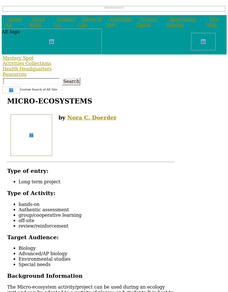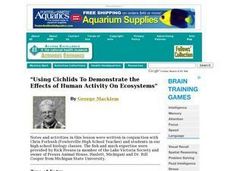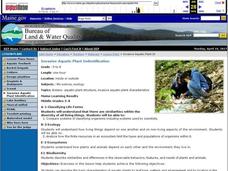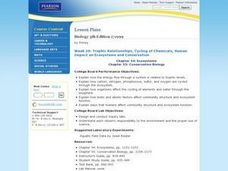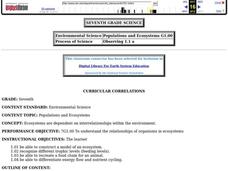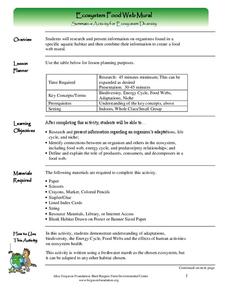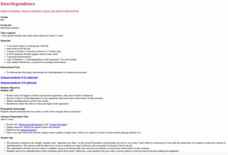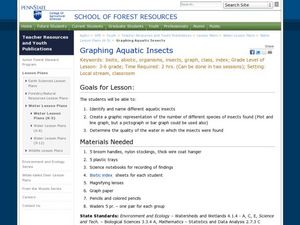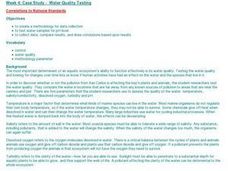Curated OER
Biomanipulation
Young scholars explore the effects of aquatic trophic relationships on water transparency. They observe and explain the effects of reducing nutrient inputs on agal density on water transparency.
Curated OER
Personal Ecosystem
Young scholars build an aquatic ecosystem using large glass pickle jars. In this ecology lesson, students build and ecosystem then observe and collect data on the habitats. In this long term project young scholars observe a population...
Curated OER
Water Cycle and Ecosystems
Students explore the water cycle. In this investigative lesson, students examine the water cycle process. They will record their observations and discuss marine and freshwater ecosystems.
Chicago Botanic Garden
Nature Walk and Ecosystem Introduction
A food web has no organism higher than a tertiary consumer because there wouldn't be enough energy left to sustain them. The fourth installment in a seven-part series begins with a nature walk to get pupils thinking about their...
Curated OER
Careers With an Aquatic Emphasis
Young scholars are introduced to careers with an aquatic emphasis. They take a self-evaluation test on what they enjoy in school to determine which career is right for them. They listen to people in the field discuss what their job is like.
Curated OER
Micro-Ecosystems
Students create a sustainable, self-contained ecosystem in a ten-gallon aquarium.
Curated OER
"Using Cichlids To Demonstrate the Effects of Human Activity On Ecosystems"
Students explore the freshwater ecosystem of Africa's Lake Victoria by creating a freshwater aquarium. They investigate factors affecting the aquarium's ecosystem and conduct lab activities.
Curated OER
Ecosystems: What Are They and How Do They Work?
Students explore the characteristics of major ecosystems, the interactions of the organisms within the systems, and the effects of humans on the system. Both living and non-living components are examined in this five lesson unit.
University of Washington
The Carbon Cycle
When it comes to the carbon cycle, the sky really is the limit. The lesson begins with observing a closed ecosystem in a bottle. Then, scholars discuss and answer questions on the carbon dioxide and oxygen cycles.
Curated OER
Invasive Aquatic Plant Identification
Young scholars observe aquatic plants and animals and identify their systems. In this plants and animals lesson plan, students compare systems of organisms and orally express how plants and animals rely on each other.
Curated OER
Trophic Relationships, Cycling of Chemicals, Human Impact on Ecosystems and Conservation
Students explore how the energy flow through a system is related to trophic levels. They investigate how organisms affect the cycling of elements and water through the biosphere. Students participate in lab activities to observe ways...
Curated OER
Exploring Ecosystems
Fourth graders create an ecosystem as a class. They have already produced smaller ones. They use a pond or something similar on school grounds to meet the needs of certain plants and animals of their ecosystem. Specifically created will...
Curated OER
Populations and Ecosystems
Seventh graders create a model of an ecosystem and label it to show structure and function. They research the food web of an aquatic animal and also trace energy flow from the primary producer up the food chain.
Curated OER
Ecosystem Food Web Mural
Learners create a food web mural about an ecosystem of the freshwater marsh. For this food web lesson plan, students write about the organisms and how each one depends on another.
Curated OER
Interdependence: Discovering What Makes a Balanced Ecosystem
Students demonstrate that plants and animals are interdependent in a balanced ecosystem.
Curated OER
Forest In A Jar
Students conduct an experiment using soil, water, seeds, a plant, and a jar; and then draw a poster to represent their observations and findings. They make a poster showing what happened to their aquatic environment.
Curated OER
Trophic Pyramids and Levels
The bulk of this lesson involves the construction of both an aquatic and a terrestrial ecosystem in which to observe trophic relationships. Detailed directions are provided, as well as discussion questions, and assessment activities....
Curated OER
Point- vs. Non-point Pollution
Students differentiate between point and non-point pollution and determine how the different types of pollution are harmful to aquatic ecosystems. They complete a series of tests on a sample of "polluted" water and a sample of "pure" water.
Curated OER
Graphing Aquatic Insects
Students identify aquatic insects. In this organism instructional activity, students locate aquatic insects near a local waterway and collect them. Students graph the amount of insects that they collected.
Curated OER
Bottle Habitat
In groups of four, learners construct aquatic habitats in pop bottles. They create charts and record data from observations over a four week period. Then they graph their data and write explanations for what they observed.
Curated OER
Water Quality Testing
Student explore factors affecting ecosystems. They test local water samples for pH level. After creating a methodology for data collection, they collect data, compare results, and draw conclusions based upon results.
Curated OER
The High Cost of Chemical Dependency
Sixth graders explore, analyze and study the effect and impact that humans have on the environment based on their choices as individuals, businesses and governments. They assess the balance between human activities and aquatic pollution.
Curated OER
Photosynthesis and Respiration
Students comprehend the relationship between plants and animals in an aquatic ecosystem. They predict the effects of low dissolved oxygen on the organisms. Students create microcosms with plants, animals, or both. They determine which...
Curated OER
Pond Ecosystem Field Trip
Students investigate the environment by participating in a class trip. In this pond ecosystem lesson, students define a list of vocabulary terms associated with ponds such as invertebrate and metamorphosis. Students attend a field trip...
Other popular searches
- Aquatic Ecosystem Activities
- Aquatic Ecosystems Estuary
- Classroom Aquatic Ecosystem
- Science Aquatic Ecosystems
- Aquatic Ecosystem Models
- Aquatic Ecosystems Demo







